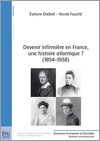Prix de thèse 2011 de la Fondation Médéric Alzheimer
La Fondation Médéric Alzheimer lance son appel à « Prix de thèse 2011 » en sciences humaines et sociales d’un montant de 12 000 €. Ce Prix récompense les titulaires d’une thèse de doctorat en sciences humaines et sociales (anthropologie, démographie, droit, économie, philosophie, psychologie, santé publique, sciences du langage, sciences politiques, sociologie), soutenue entre le 15 septembre 2009 et le 30 mai 2011.
Chaque année, la Fondation Médéric Alzheimer promeut et valorise les travaux de jeunes chercheurs en sciences humaines, sociales et psychosociales par l’attribution de Prix de thèse.
Ce Prix récompense les titulaires d’une thèse de doctorat en sciences humaines et sociales (anthropologie, démographie, droit, économie, philosophie, psychologie, santé publique, sciences du langage, sciences politiques, sociologie), soutenue entre le 15 septembre 2009 et le 30 mai 2011.
Cette année seront éligibles au Prix de thèse de la Fondation Médéric Alzheimer les travaux portant sur :
les enjeux de société induits par la maladie d’Alzheimer et les maladies apparentées (dans ses dimensions anthropologiques, démographiques, économiques, éthiques, juridiques, philosophiques, politiques, psychologiques, sociales)
et/ou
l’amélioration de la qualité de vie des personnes malades et de leurs aidants familiaux, bénévoles ou professionnels
Les candidats au Prix de thèse doivent :
avoir poursuivi leur thèse dans une université française ou étrangère,
avoir rédigé leur thèse en langue française,
ne pas avoir obtenu un autre Prix pour la thèse de quelque nature que se soit.
Date limite de candidature : 20 juin 2011
Composition du jury
Les dossiers complets seront examinés par un jury composé de membres de la Fondation et d’experts du domaine. Une instruction préalable des dossiers sera effectuée par des experts choisis selon les disciplines des postulants.
Attribution du Prix de thèse
Le Prix de thèse 2011, d’un montant de 12 000 €, est forfaitaire et non renouvelable.
La Fondation se réserve le droit de ne pas remettre de Prix de thèse.
Critères de sélection
Le jury de la Fondation sera particulièrement sensible aux caractéristiques suivantes :
pertinence de la recherche vis-à-vis des thématiques du Prix de thèse 2011,
qualité du dossier: d’une part sur le contenu (hypothèses de travail, méthodologie, problématique, perspectives, approche en termes de comparaison internationale, bibliographie), et d’autre part sur les pièces fournies (CV, lettre de motivation, publications et communications du candidat),
originalité de la thèse au regard de la recherche au plan national et international,
dimension interdisciplinaire et approche comparative au plan international,
cadre éthique de la recherche .
Composition du dossier :
Formulaire de candidature
Présentation synthétique de la thèse.
Résumé de la thèse
Avis motivé du directeur de thèse
Autorisation d’utilisation de la photographie.
Justificatifs
Copie d’une pièce d’identité.
Curriculum Vitae (2 pages maximum) avec la liste de l’ensemble de vos publications et communications.
Lettre de motivation (2 pages maximum).
Photographie.
Attestation du diplôme délivré par l’Université de rattachement.
Rapport de soutenance.
Un extrait de 5 pages maximum de la thèse, choisi en toute liberté par le candidat (choix à justifier brièvement dans la lettre de motivation).
Un exemplaire ou un tiré à part des publications en rapport avec la thèse.
NB : les dossiers complets doivent être adressés en 2 exemplaires, dont un exemplaire non relié et non agrafé avant le 20 juin 2011 (cachet de la poste faisant foi). Indiquer obligatoirement la mention « original » sur le dossier comportant les signatures originales et les documents originaux.
Modalités de participation et dossier de candidature : http://www.fondation-mederic-alzheimer.org/fre/Soutien-a-la-Recherche/Prix-de-these-2011.
Des renseignements complémentaires peuvent être obtenus auprès d’Harold Kasprzak à l’adresse suivante : kasprzak@med-alz.org.
Adresse : Fondation Médéric Alzheimer , Pôle Etudes et Recherche, 30 rue de Prony, 75017 Paris

